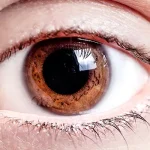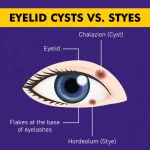Air pollution refers to the mix of harmful particles, gases, and elements in the air that can reach high levels of concentration, both indoors and outdoors. The effects of air pollution are very harmful to our general health and for the health of our eyes too, which are the most sensitive sensory organs in our body. Some examples of common air pollutants include soot, smoke, mould, methane, and carbon dioxide. A common index to measure air pollution is known as the Air Quality Index, which judges the air conditions based on the following factors:
- Ground-level ozone
- Particle pollution or particulate matter
- Carbon Monoxide
- Sulfer dioxide
- Nitrogen dioxide
Some other contributors to air pollution include:
- Cigarette smoke
- Asbestos
- Volatile Organic Compounds (VOC)
- Formaldehyde
- Other substances
Air pollution is a global health hazard and has been linked to higher rates of cancer, heart disease, stroke and other respiratory diseases. Human eyes are sensitive and prone to irritations from allergies, chemicals and pollutants in the air. Some people might notice their eyes are red and itchy on days air pollution is high. Manifestations of air pollution can range from minimal or no symptoms to a chronic discomfort and eye irritation. There may also be specific situations, in contact lens wearers for example, where the eyes may be adversely affected by air pollution. Despite the presence of air pollution in many indoor and outdoor environments, the effects of air pollution on our eyes are often overlooked by us. The information below will help us understand the effects of air pollution on eyes and what can be done to mitigate the problems. There is a range of symptoms which occur due to air pollution. It may range from simple irritation and burning to a severe allergy, cataract and in rare cases even increase the risk of cancer. The most commonly experienced problems are- redness, burning sensation, watering, ropy discharge, itching sensation, dry & gritty sensation, difficulty in vision due to watering and itching etc. While wearing face masks may help minimize inhalation of particulate matter, the eyes remain exposed to airborne pollution. Studies have found that in areas where air pollution is high, people were more likely to report eye related discomfort and are 3 to 4 times more likely to be diagnosed with dry eye. Now that we understand how these air pollutants can affect the eyes, here are few tips for certain scenarios which can save you from the unnecessary suffering. 1) Stay indoors when pollution levels are at their peak If there is excessive particulate matter in the air, limit your exposure to outdoors and wherever possible, protect your eyes with spectacles and/or masks. If it is absolutely necessary for you to go outside, wear sunglasses (wrap-around styles are best) to prevent pollutants entering your eyes. Even though it is possible for the air indoors to be polluted too, it is often negligible when compared to the air outside. Other environmental factors such as harmful UV rays of the sun also contribute to creating problems for our eyes and vision. Staying in during peak pollution levels allows you to avoid exposing your eyes to harmful elements of nature. 2) What to do while using Eye Contacts If wearing contact lenses, use lubricating eye drops as needed and ensure that you clean and disinfect your lenses thoroughly with lens solution each time you wear or remove them. Protective glasses over contact lenses may be useful if the air contaminant levels are high. If there is any irritation and/or foreign body sensation with contact lenses, remove them immediately and rinse your eyes with lubricant eye drops. Clean lenses thoroughly prior to reinserting. Avoid wearing contact lens and eye makeup if your eyes are feeling sore. Contact lenses can cause eye infections if used incorrectly and a lot of attention and care should be exercised by contact lens wearers for their daily eye care regime. Another disadvantage of contact lenses is that they often make our eyes drier than usual, which may create serious vision problems like dry eye syndrome. 3) If pollutants made contact with the eyes Avoid rubbing your eyes directly even if fine particulates have entered the eyes. Wash your eyes with water and apply a cool compress to help reduce irritation. Furthermore, use lubricating eye drops given by eye doctor. Lubricating eye drops help prevent soreness or itching. If you experience highly dry and irritated eyes due to pollution, visit your ophthalmologist for a quick diagnosis and recommended course of treatment, and follow the tips given above to reduce the issues regarding the health of eyes. With a little help, you can reduce your eyes irritation and have clear vision to enjoy the world as it should be. 4) Follow a regular eye care routine Lastly, it might be impossible for some of us to completely stop our eyes from getting exposed to pollution due to our lifestyle choices. In such cases, try to limit your time outside as much as possible and follow a strict and regular eye care routine every day. You may consult your ophthalmologist when creating an eye care routine to ensure that it would be effective in protecting your eyes and preventing diseases due to air pollution. Air Pollution in India India has a long way to go in terms of controlling air pollution. The major causes of air pollution in the country are fuel and biomass burning, adulteration of fuel, traffic congestions, and greenhouse gas emissions. Even though it varies from state to state and from city to city, the health effects of the poor quality of air are felt all over the nation. The major cities of India like Delhi, Kolkata, Mumbai, and Chennai all lag behind when it comes to ensuring the air is free of pollution. It is under these circumstances that we urge you to think about your health and your eye’s health in the context of air pollution. By following some simple steps and precautions, you can save yourself from the harmful effects of the poor air quality in India. Read Also: How to protect your eyes from SMOG





